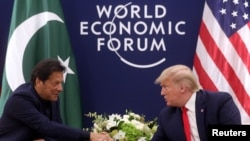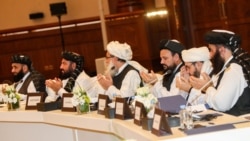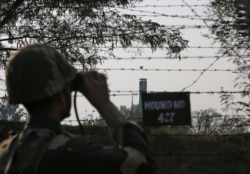President Donald Trump met Pakistani Prime Minister Imran Khan on Tuesday in Davos, on the sidelines of the World Economic Forum, and hailed the growing relationship between the United States and Pakistan.
A post-meeting U.S. statement said the two leaders agreed to continue efforts to seek a lasting political settlement to the war in Afghanistan, America's longest. It said the meeting also discussed, among other issues, ways to expand U.S.-Pakistan trade.
"We're getting along very well. I would say we've never been closer with Pakistan than we are right now," Trump told reporters at the start of his meeting with Khan.
This was the third interaction between the two leaders since Trump hosted Khan at the White House in July 2019, which underscores warming bilateral relations.
"It's great to be with a very good friend of mine, the Prime Minister of Pakistan," Trump remarked.
The progress in Pakistan's long, close and turbulent relationship with the United States stems from Islamabad's cooperation in facilitating Washington's ongoing peace talks with the Taliban insurgency in neighboring Afghanistan.
"The main issue, of course, is Afghanistan, because it concerns the U.S. and Pakistan," Khan stressed in his pre-meeting remarks to reporters. "And fortunately, we are on the same page. Both of us are interested in peace there and an orderly transition in Afghanistan with talks with the Taliban and the government."
The yearlong U.S.-Taliban dialogue is seeking an American troop withdrawal from the country in return for the insurgent group's counterterrorism assurances and commitment to enter into intra-Afghan negotiations to permanently end years of hostilities in the countries. The two sides are believed to be on the verge of signing a peace deal.
Trump offers help on Kashmir
While referring to escalation in tensions between Pakistan and India over their territorial Kashmir dispute, Trump said Tuesday he was ready to help the two South Asian nations, using his close ties with their leaders.
"We're talking about Kashmir and the relation to what's going on with Pakistan and India. And if we can help, we certainly will be helping," Trump said. "And we've been watching that and following it very, very closely."
Khan welcomed Trump's remarks, and described tensions with India as "a big issue" for Pakistan.
"And of course, we always hope that the U.S. will play its part in resolving it, because no other country can," he noted.
In previous meetings with Khan, Trump had also offered his mediation, though they were swiftly rejected by India. New Delhi insists Kashmir is strictly a bilateral dispute with Islamabad and requires no third-party intervention.
Bilateral tensions have dangerously escalated since early August when the Indian government unilaterally scrapped the special autonomous status for the two-third part of Kashmir it administers.
New Delhi has since placed millions of Kashmiris under security restrictions coupled with a communication blockade to deter violent protests against its controversial actions.
The measures have drawn international criticism of the Indian government.
Islamabad, which administers the rest of the region, has rejected the Indian actions as a violation of International law. Pakistan says Kashmir is an internationally recognized disputed territory under decades-old United Nations Security Council resolutions, and neither country is authorized to alter the region's status.
The Kashmir dispute has sparked two of the three wars between India and Pakistan. It remains the primary source of regional tensions.






